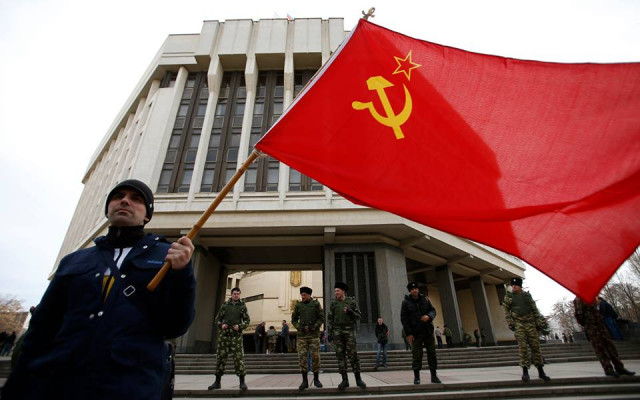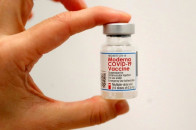Crimean MPs vote to join Russia, US unveils sanctions
The motion was passed by 78 out of 86 MPs in favour.

A man holds a Soviet Union flag as he attends a pro-Russian rally at the Crimean parliament building in Simferopol March 6, 2014. PHOTO: REUTERS
Pro-Russia lawmakers said they would also put the question of secession from Ukraine to a referendum on March 16, as the worst East-West crisis since the Cold War deepened with Russian forces maintaining their grip on the region.
The motion was passed by 78 out of 86 MPs in favour and was immediately condemned by Ukrainian authorities as "illegitimate", while the large ethnic Tatar minority in the Black Sea peninsula said they would boycott the vote.
Gunmen at an improvised checkpoint on Crimea's regional border with the rest of Ukraine also on Thursday blocked a group of 40 unarmed military observers from carrying out an inspection mission requested by Ukraine's government.
A spokeswoman for the Organization for Security and Co-operation in Europe, Natacha Rajakovic, said they were "prevented from entering Crimean territory" and would stay in a hotel in nearby Kherson to "decide on next steps".
A Western diplomatic source said that the gunmen, who did not identify themselves, were "very professional, very well-trained -- this was not some militia".
Wider diplomatic efforts to defuse the crisis also appeared to stall, with a second round of talks between US Secretary of State John Kerry and Russian Foreign Minister Sergei Lavrov in two days ending with no agreement.
With an executive order, US President Barack Obama also approved possible visa bans and property sanctions against people seen as "directly involved in destabilising Ukraine, including the military intervention in Crimea".
The measures were "in response to Russia's ongoing violation of Ukraine's sovereignty," the White House said.
European Union leaders at a hastily convened emergency summit in Brussels also pushed for Russia to opt for dialogue and de-escalation, while warning that sanctions were in the offing should Moscow refuse a diplomatic solution.
"We have got to make sure we get Russia and Ukraine talking to each other," said British Prime Minister David Cameron.
Invited to attend the summit in a strong symbolic gesture, Ukraine's interim premier Arseniy Yatsenyuk accused Russia of continued provocation around Ukrainian bases in Crimea.
"This is not only a Ukraine-Russia crisis, it is a crisis in Europe," said Yatsenyuk, who took over just last month after former pro-Moscow president Viktor Yanukovych fled to Russia following three months of deadly protests.
The demonstrations began in November after Yanukovych abruptly turned down an EU association agreement and instead negotiated a bailout from Russia and quickly snowballed into a wider uprising against his leadership.
Yatsenyuk said in Brussels that Ukraine was now "determined" to sign the agreement "as soon as possible".
The bloc's 28 leaders met a day after the European Union executive offered Ukraine a huge 11-billion-euro ($15 billion) aid package to support its ailing economy and help pay massive gas bill arrears to Russia.
Europe's G8 members, Britain, France, Germany and Italy, have along with the US, Japan and Canada, suspended preparations for a June summit to be hosted by Putin in Sochi, though Germany and Italy had to be prodded to agree.
EU nations remain divided on how to respond to Russia, with new EU members from eastern Europe once in the Soviet sphere far tougher than the likes of France and Germany.
Lithuanian President Dalia Grybauskaite called for a harsher EU response, warning that a "dangerous" Russia was trying to redraw Europe's borders.
"Today it is an open and brutal aggression, that is exactly what is happening and we need to understand it," she said.
"But today I do not see a prompt reaction," she said, adding: "Russia today is dangerous. Russia today is unpredictable."
The epicentre of the crisis has been Crimea -- a rugged region seized by Russia in the 18th century and annexed to Ukraine in Soviet times as a "gift", which is still home to Russia's Black Sea Fleet.
Russian forces have surrounded Ukrainian military bases in Crimea for days and on Thursday even scuttled an old warship at the entrance of a lake, trapping Ukrainian navy vessels.
Inside the besieged Ukrainian bases, nervous soldiers were standing their ground, refusing to surrender or hand over their weapons, but in most cases clearly not ready to hold off an all-out Russian assault.
"It's extremely tense and I consider it a miracle that bloodshed has been avoided so far," Tim Guldimann, personal envoy of the Swiss chair of the OSCE, said in Kiev after returning from Crimea.
Guldimann said he cut short his visit after UN special envoy to Crimea Robert Serry was forced to leave on Wednesday upon being confronted by gunmen who said they had orders to take him to the airport.
Serry took the first flight out of the region -- to Istanbul -- but returned to Kiev on Thursday.
"My mission is not yet over," Serry told reporters at the airport. Asked if he would return to Crimea, he answered: "No I don't think so".
Violent protests have also broken out in cities in mainly Russian-speaking eastern Ukraine, where several local government offices have been taken over by crowds of angry pro-Russian militants waving Russian flags.
There has been concern among observers about the possibility of a Russian intervention in other parts of eastern Ukraine outside Crimea using the defence of the rights of pro-Moscow militants as justification.
Putin has condemned the changeover of power in Kiev as "an unconstitutional coup" but said a full-scale military intervention in Ukraine would be a "last resort".
That threat is darkening the mood in Yalta, a seaside resort in Crimea where the post-war borders of Europe were decided and the spring sun has just started to shine.
"We are against Putin's aggression, we fear that it will scare tourists away," said Lilia Ivanova, manager of a local Intourist travel agency.
"There is no tourism where there is terrorism," she said.



















COMMENTS
Comments are moderated and generally will be posted if they are on-topic and not abusive.
For more information, please see our Comments FAQ